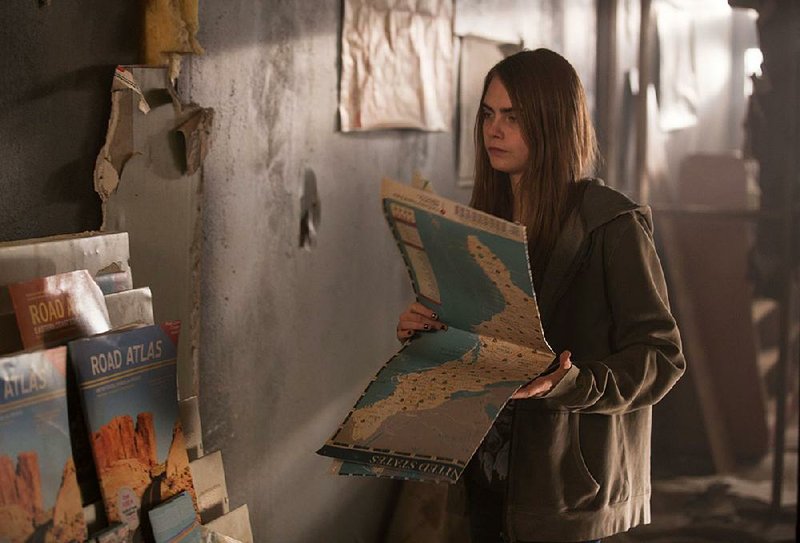Based on an earlier teen fave novel by The Fault in Our Stars author John Green, Paper Towns is a mild coming-of-ager about dawning awareness and life lessons learned among a small group of Florida high school seniors. Part mystery story, part road movie and part pre-prom graduation romp, the film is most interesting as a perspective on adolescence in which all the girls are more mature, nervy and perceptive than any of the boys, who have some catching up to do if they're to have a chance with any of them.
Adapted by Stars screenwriters Scott Neustadter and Michael H. Weber from the winner of an Edgar Award for best young adult mystery novel of 2008, Paper Towns hinges on the lifelong fascination the smart, semi-dweeby Quentin (Nat Wolff, who played the lead's best friend in Stars) nurses for his across-the-street neighbor Margo (Cara Delevingne). Best friends and partners in crime as young kids, they've grown apart since Margo became hot and popular, so it comes as a jolting surprise to Q, as he's known, when Margo shows up in his bedroom late one night shortly before the end of the school year and dares him to take her out in his parents' car. She won't specify the reasons but breaks down his wimpy resistance merely by saying, "Basically, this is going to be the best night of your life."
Paper Towns
82 Cast: Nat Wolff, Cara Delevingne, Halston Sage, Austin Abrams, Justice Smith, Jaz Sinclair, Cara Buono
Director: Jake Schreier
Rating: PG-13, for some language, drinking, sexuality and partial nudity — all involving teens.
Running time: 109 minutes
Margo's agenda is to extract revenge on her cheating boyfriend, which she does, with some reluctant help from Q, in prankishly creative ways. After Margo has visited sufficient humiliation and discomfort on her ex, she and Q end up in a high-rise looking down on Orlando at night, which puts her in a philosophical mood: It's "a paper town with paper people," she observes, to which Q reacts with an incomprehension likely to be matched by that of the audience. But she tartly adds that Q's comfort zone is very small compared with her own and that he will need to take much greater risks if he wants to get something out of life and, by implication, from her.
And then she disappears. Completely. She doesn't show up at school for days; she's left home. No one knows what to think. While Q and his borderline-nerdy buds Ben (Austin Abrams) and Radar (Justice Smith) count the days until graduation and mull over prom plans -- the particularly obnoxious Ben fantasizes about taking blond bombshell Lacey (Halston Sage), who has just split with her boyfriend, while Radar plans to lose his virginity that night to his girlfriend, Angela (Jaz Sinclair) -- Q fixates on the idea that Margo has left hidden clues about her whereabouts that he begins piecing together and sharing with his patient but skeptical friends.
Some apparent tips involve references to such old standby counterculture heroes as Woody Guthrie and Walt Whitman, while others require repeated visits to a boarded-up building that director Jake Schreier (Robert & Frank) tries but fails to build into spooky suspense sequences.
Despite pretty flimsy evidence, Q manages to convince his pals that they should drop everything and join him on a drive all the way to New York state, where he is certain Margo's hiding in a true "paper town" (a term for nonexistent communities created by map-makers to thwart plagiarizers). So Ben, Lacey, Radar and Angela all agree to pile into a minivan for the trek -- provided Q guarantees their return by prom night.
For entirely accidental reasons, Paper Towns will receive an enormous amount of unintended notoriety based on an incidental sequence that touches upon some major ongoing news. At a gas station pit stop somewhere in the South, Radar, who is black, decides he needs a new shirt and picks one up. It isn't until they're all back in the van, however, that he unfolds the T-shirt to discover the Confederate flag splashed across it along with the phrase, "Heritage Not Hate." He laughs about it and merely turns it inside out before putting it on
By the end, nearly all the story's questions, mysteries and dilemmas have been neatly answered and tied up, with just a dash of melancholy and a hint of maturity added to the mix as life moves on, albeit with more than a bit of fantasy where Ben and Lacey are concerned. In its considered, neatly packaged way, the film occupies a safe and solid middle-class middle ground in teen storyland between crass gross-out comedies and mawkish romance on one side and edgy, exploratory indie fare on the other.
The affable sincerity of the cast helps, led by the likably open performance by Wolff, whose Quentin becomes visibly aware of how much growing he has still got to do. Delevingne delivers sufficient dynamics to carry the early going with her character's well-wrought sense of payback and mystery, but she remains largely off-screen most of the way.
MovieStyle on 07/24/2015
